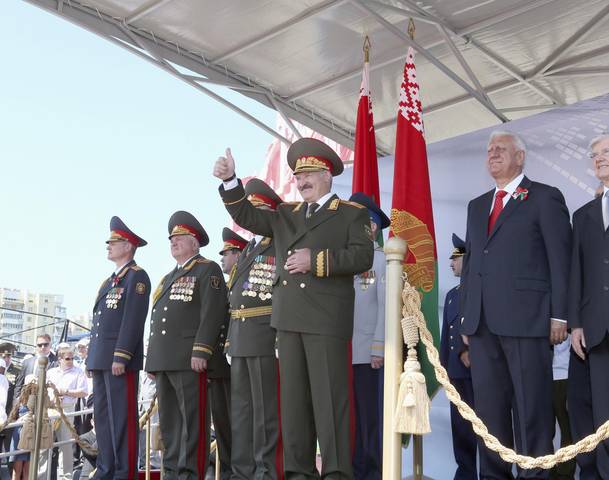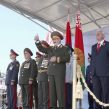
Belarus: An Inordinate Amount of Déjà Vu
Publication: Eurasia Daily Monitor Volume: 10 Issue: 127
By:

Two identical texts in English (https://www.eurasiareview.com/28062013-belarus-and-the-eurasian-union-incremental-integration-analysis/) and in Russian (https://naviny.by/rubrics/economic/2013/06/29/ic_articles_113_182193/) specify pluses and minuses of Belarus’s involvement in the Russian-led Eurasian integration project. In the opinion of the Belarusian Institute for Strategic Studies (BISS), a Minsk-based think tank funded by the West, the biggest plus is Russia’s financial subsidies that come in the form of cheap natural gas prices, re-exports of refined oil products, and the preferential treatment of Belarusian goods on the Russian market. In 2012, Russian subsidies amounted to 15.9 percent of Belarus’s GDP. The second benefit is that within the Eurasian Union Belarus will be able to block Russia’s free-trade agreements with third countries. This was reportedly evidenced in a recent case involving New Zealand’s exports of dairy products to Russia. The third benefit is that unobstructed labor migration from Belarus to Russia (currently between 200,000 and 300,000 people, annually) lowers pressures on Belarus’s labor market, allows Belarus to save on unemployment benefits, and generates a flow of remittances. The final benefit is political leverage. Whereas in the Customs Union’s Commission, Belarus has only 21.5 percent of votes while Russia controls 57 percent, in the Eurasian Union (EaU; to be ushered in by 2015), each of its three founding member countries will have equal political weight. The minuses of Eurasian integration include dependency on foreign direct investments from one source, Russia, and critical energy dependency on Russia against the backdrop of Russia’s reduced dependence on Belarus’s oil transit after the launch of the BPT-2 oil terminal in St. Petersburg.
One downside of the Eurasian Union came to the fore in the one-day national strike of small Belarusian entrepreneurs that took place on June 27. Within the EaU, Belarusian retailers will be required to file for security certificates of “light industry” products (consumer goods). The certificates add to costs and run the risk of making small businessmen less competitive. Although the new law requiring the aforementioned certificates will be enacted with a one-year delay (i.e., not July 1, 2013, as originally planned, but July 1, 2014), the entrepreneurs still announced a warning strike (https://www.itar-tass.com/c1/787787.html). Independent observers, however, do not believe that the strike will generate wider protests (https://www.svaboda.org/archive/pragueaccent/latest/597/603.html).
Just like Belarus’s participation in the EaU, the country’s official Independence Day of July 3 has everything to do with its eastern neighbor. On that day, in 1944, the Soviet Red Army liberated Minsk from the Nazis. From 1991 to 1996, however, Belarus celebrated its Independence Day on July 27—the day on which, in 1990, the Supreme Soviet of the Byelorussian Soviet Socialist Republic (BSSR) adopted its Independence Declaration. According to Vadim Gigin, the country’s most popular pro-government blogger, this was an unfortunate choice for the major national holiday because back in 1990 the Soviet Union was still around. On the other hand, the opposition would like to make March 25 the country’s national independence holiday. On that day in 1918, the Belarusian People’s Republic (BPR) was proclaimed; it existed for nine months until the BSSR came about. According to Gigin, March 25 fits even less as a viable Independence Day for Belarus because the BPR existed under German military occupation, the BPR’s independence declaration failed to gain international recognition, and the entity that proclaimed independence suffered from inner conflict and was disbanded in 1925. “The national holiday,” maintains Gigin, “should be associated with victories, not with constant whining about abortive projects” (https://blog.belta.by/?author=3).
Earlier this month, on July 3, President Alyaksandr Lukashenka dedicated the Square of the National Flag in Minsk at the junction of Prospekt Pobeditelei (Avenue of the Victors) and Orlovskaya Street. The 14-by-7-meter national flag on a 70-meter-high flagpole was hoisted in the middle of that square (https://news.tut.by/society/355776.html). Lukashenka also gave a speech in which he declared that “we learned how to deal with threats to our independence” and warned that globalization and the information revolution pose new challenges as they “blur the well-established spiritual values on which human civilization was based and destroy the identity of countries and people, especially of those who cannot and do not want to defend themselves.” Lukashenka also bemoaned the spirit of dependency as a downside of a strong patrimonial state (https://www.belta.by/ru/all_news/president/Belarus-nauchilas-spravljatsja-s-ugrozami-nezavisimosti-i-sumeet-zaschitit-svoj-suverenitet—Lukashenko_i_639900.html).
Incidentally, a June national survey by the Independent Institute for Socio-Economic and Political Studies (IISEPS) revealed that Lukashenka’s popularity rating is up. Whereas in December 2012, 31.5 percent of the respondents were willing to vote for Lukashenka “if the presidential elections were tomorrow;” in March 2013, 33.4 percent were; and in June the share of those willing to cast their vote for him was 37.3 percent. When answering a closed-ended question that limited the number of presidential hopefuls (like it is on the election ballot), 40.9 percent of respondents preferred Lukashenka as a presidential candidate, twice as many as during the crisis of 2011. Almost 49 percent of eligible voters trust Lukashenka, whereas 40.6 percent distrust him; in March, the ratio was 43.4 percent versus 43.2 percent, respectively. Moreover, the share of those who believe the Belarusian economy is still in crisis decreased from 64.8 to 59.8 percent (https://naviny.by/rubrics/politic/2013/07/02/ic_articles_112_182231/).
One member of the opposition has already exposed her potential presidential ambition (the elections will take place in 2015). This is Olga Karach who chairs a civic campaign Nash Dom, an organization monitoring local bureaucrats and helping citizens to file complaints to the authorities and achieve results. In her interview to an online outlet of the opposition, Karach, among other things, claimed that “soon Belarusian bureaucrats will be interested in the restoration of legal norms in the country, in checks and balances, and in independent socio-political institutions more than anybody else… Just because the likelihood for the statistically average bureaucrat to end up behind bars is higher than for the average member of the opposition, and the aftermath is worse as nobody would defend that bureaucrat” (www.belaruspartisan.org/politic/235331/?).
In summary, events in Belarus display an inordinate amount of déjà vu. The country defies endless predictions of its imminent economic collapse, Russia routinely comes to its rescue, and the country’s leader is like a tilting doll that rights itself when pushed over. Indeed, the dogs bark, but the caravan goes on (see EDM, March 7).




